If Only You Knew
PROJECT
From the late 1960s, more and more women from Turkey came to the Netherlands to build new lives. What did those lives look like? We know very little about it. My book and exhibiton 'If Only You Knew' bring the stories of these women to light and give them a lasting place in Dutch history.
Bir bilsen… If only you knew… Many women begin their life stories this way when I visit them. Like Maviye, who fought for women's rights, and Selvet, who worked three shifts a day and barely saw her children as a result. Twenty-two of them are portrayed through interviews, photos from family albums, and new portraits of the women, who are now between sixty and eighty years old.
They talk about the pain of migration, homesickness, getting lost, and finding their way. Working, taking care of children, learning the language. Love and unhappy marriages. Being restricted as women and striving for emancipation. Their contribution to the Dutch economy as factory workers or cleaners, and their struggle for freedom and equal rights. Their stories are diverse, layered, and ambiguous, as every human experience is.
If Only You Knew is a multimedia project and photobook that was on display at the Nederlands Fotomuseum in Rotterdam. The photo book is available through Nai010 publishers.
Bir bilsen… If only you knew… Many women begin their life stories this way when I visit them. Like Maviye, who fought for women's rights, and Selvet, who worked three shifts a day and barely saw her children as a result. Twenty-two of them are portrayed through interviews, photos from family albums, and new portraits of the women, who are now between sixty and eighty years old.
They talk about the pain of migration, homesickness, getting lost, and finding their way. Working, taking care of children, learning the language. Love and unhappy marriages. Being restricted as women and striving for emancipation. Their contribution to the Dutch economy as factory workers or cleaners, and their struggle for freedom and equal rights. Their stories are diverse, layered, and ambiguous, as every human experience is.
If Only You Knew is a multimedia project and photobook that was on display at the Nederlands Fotomuseum in Rotterdam. The photo book is available through Nai010 publishers.
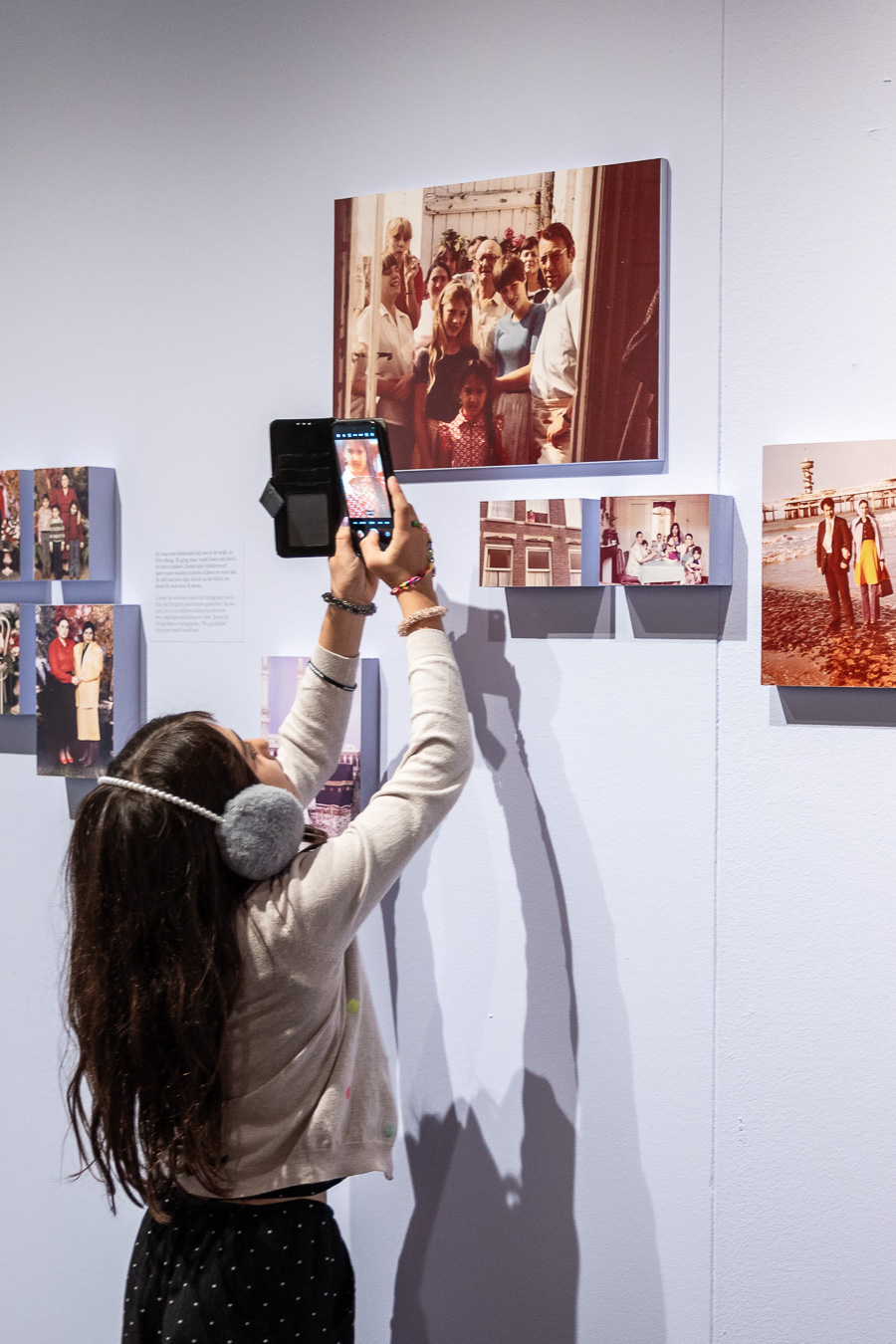
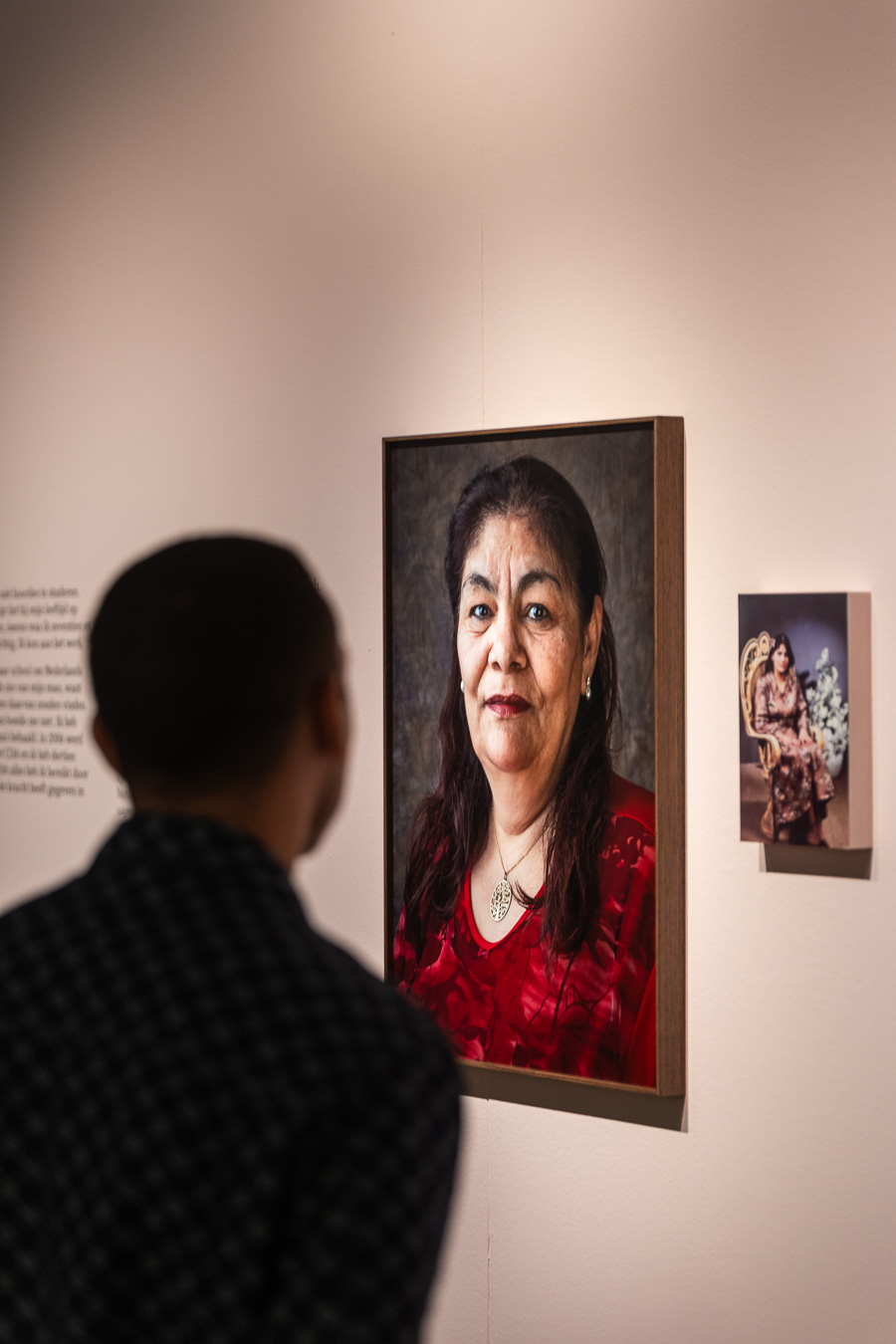
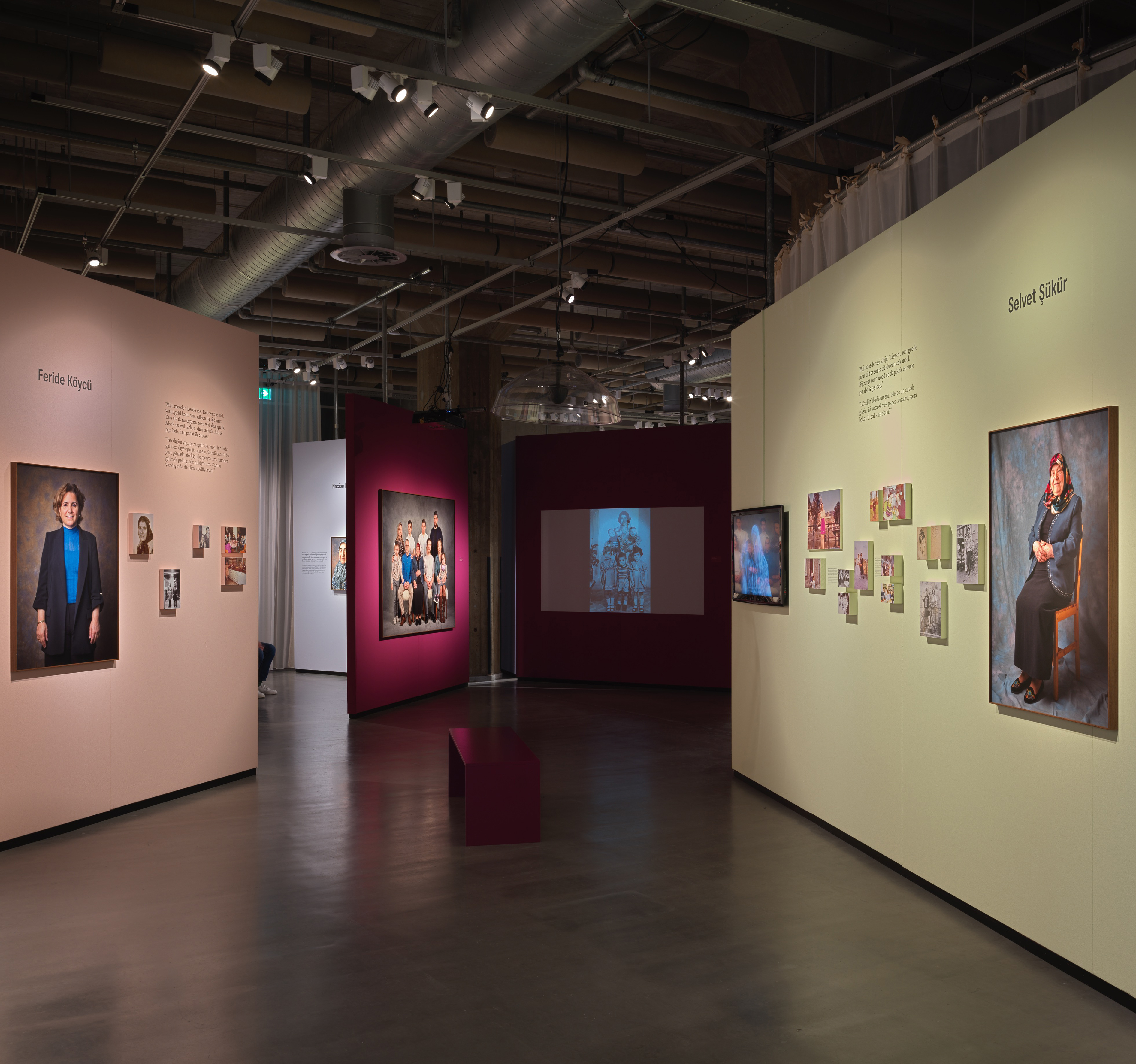
Exhibition Nederlands Fotomuseum
If Only You Knew consists of an exhibition, a book, and a video installation, and focuses on the first generation of women from Turkey in the Netherlands. At the heart of the exhibition is my video installation. Surrounding it are portraits of the women, captured in a dignified, almost painterly manner by me. These are complemented by their personal archives: pages from their family albums, large photos from their vacations, studio portraits, fragments of memories. Everything is presented alternately in video, photography, and installations. As I reconnect with and interview the women from 'Vrouwen te Gast', my work also enters into a (visual) dialogue with Van Manen's images. Bertien van Manen's work represented one of the first (female) external perspectives on this generation of women. Honest, raw, and personal, it is not only powerful but also represents the archive that has been overlooked, the gaze and image that have been forgotten. Her work takes on an honorable role in the exhibition that does justice to its iconic value.


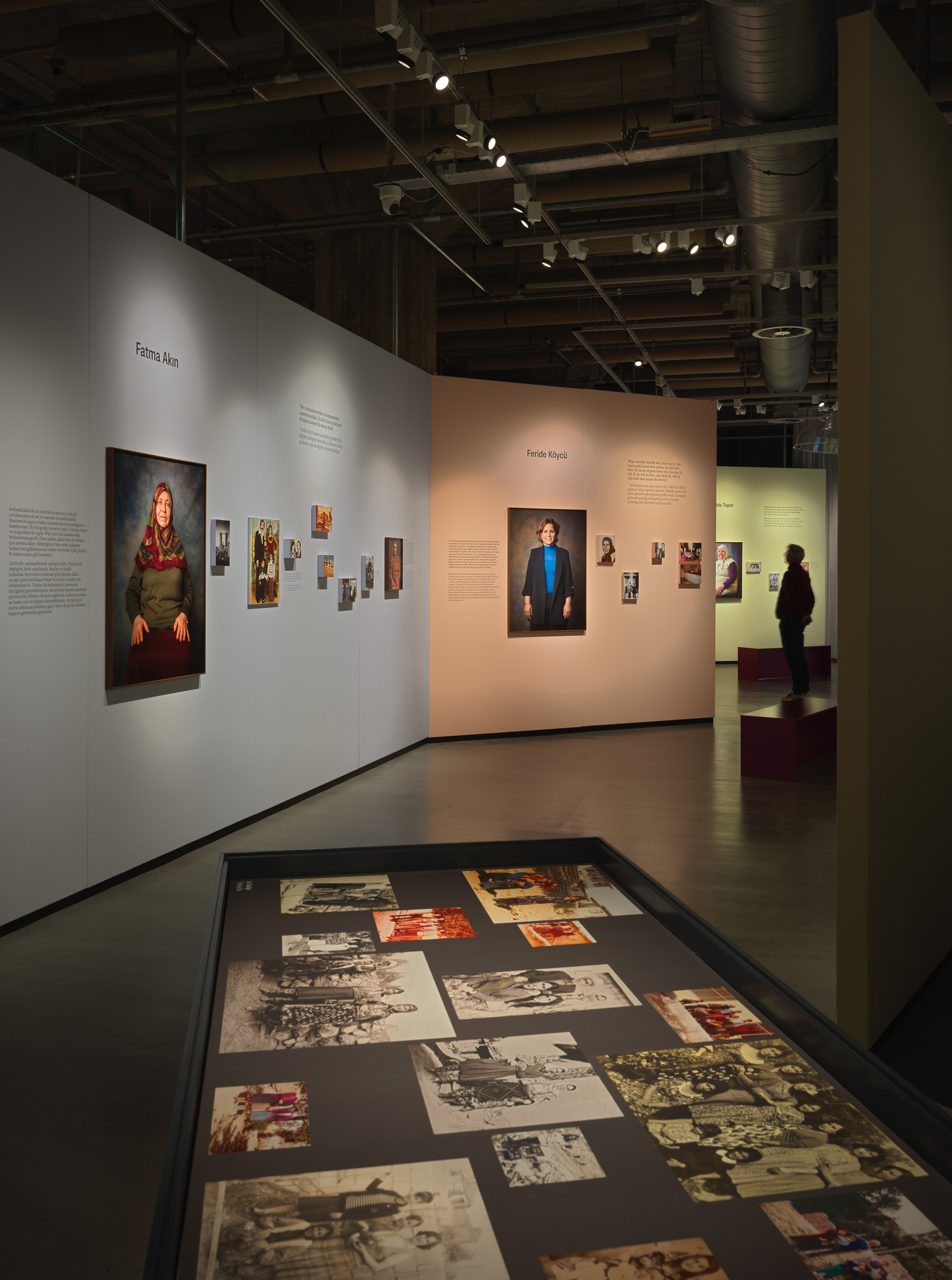
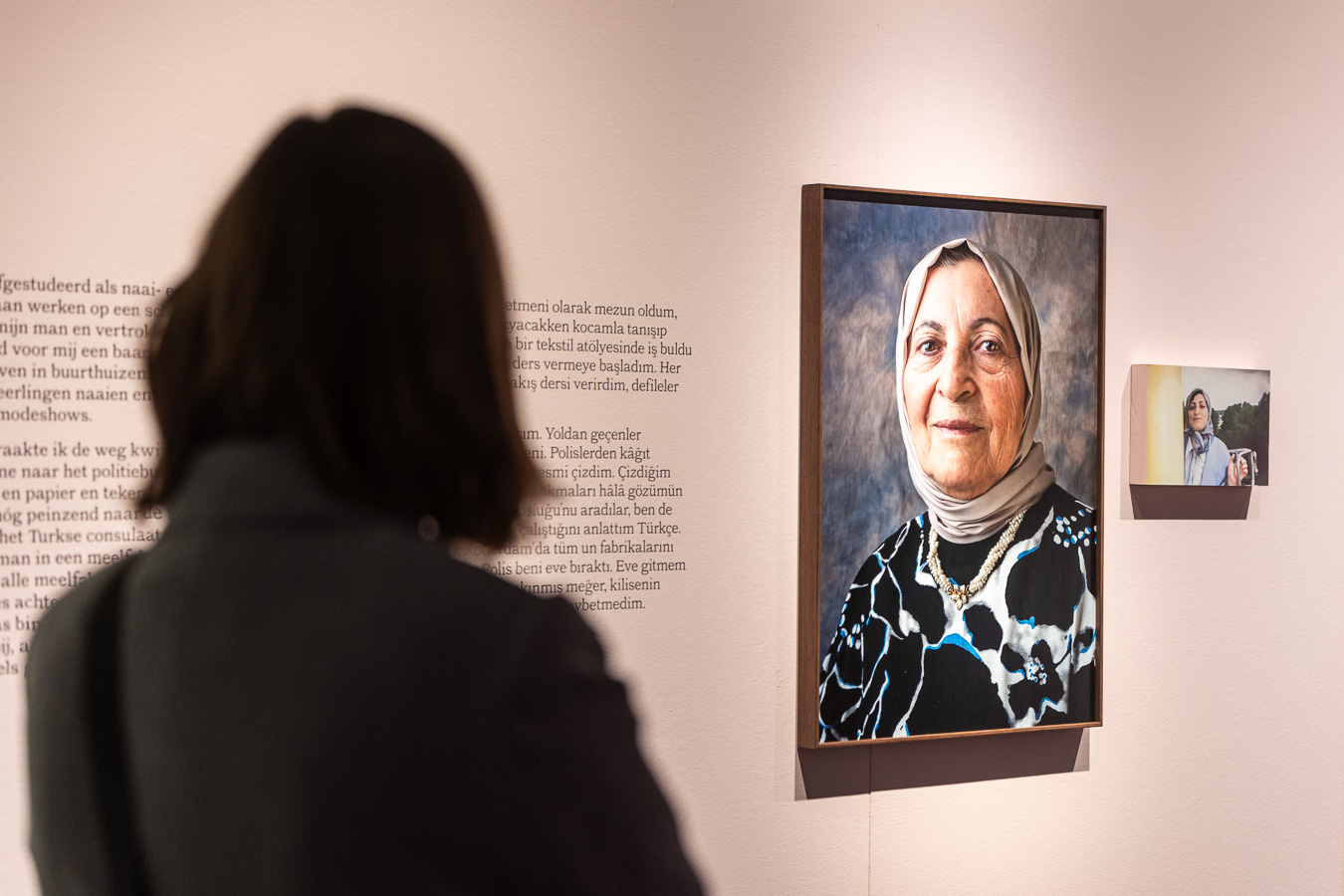

İclal Sürmeli
Urfa (1954)
Place of residence: Schiedam
![]()
‘The lion’s daughter of chef Ali, that’s what my father’s friends called me’
Urfa (1954)
Place of residence: Schiedam

‘The lion’s daughter of chef Ali, that’s what my father’s friends called me’

I drove big cars, wore leather jackets and I got infights. Like that time when a Turkish film was playingat the Schiedam Passage Theater. A boy had saidsomething rude about the women in the audience. Igrabbed him, pushed him against the door, andpunched him in the face – bam!


I was always on the phone with my friends. My neighbour didn’t have a phone, and if someone called from Turkey wanting to speak to her, I would run to her house and shout: ‘phone call from Turkey!’
Oral history video
Several of the women featured in the exhibition can also be seen on video. In filmed interviews, they recount their life stories with a photo album on their lap, sharing memories through the photographs they show. Iclal, for instance, talks about the day she arrived in the Netherlands and her dream of riding a motorcycle. Birgül shares her experience of meeting photographer Bertien van Manen and her memories of the moment Van Manen photographed her. Zehra, a third-generation Turkish-Dutch woman, reflects on what her grandmother’s story means to her. And Selvet tells how she fell in love with her husband, came to the Netherlands with him, and had to work hard to obtain her residence permit.
Publication
All of these personal stories and photographs have been compiled in the book If You Only Knew. This publication serves as a lasting record, honoring the lives and voices of these women, and ensuring their experiences and photographic archives are rightfully embedded within our collective history.
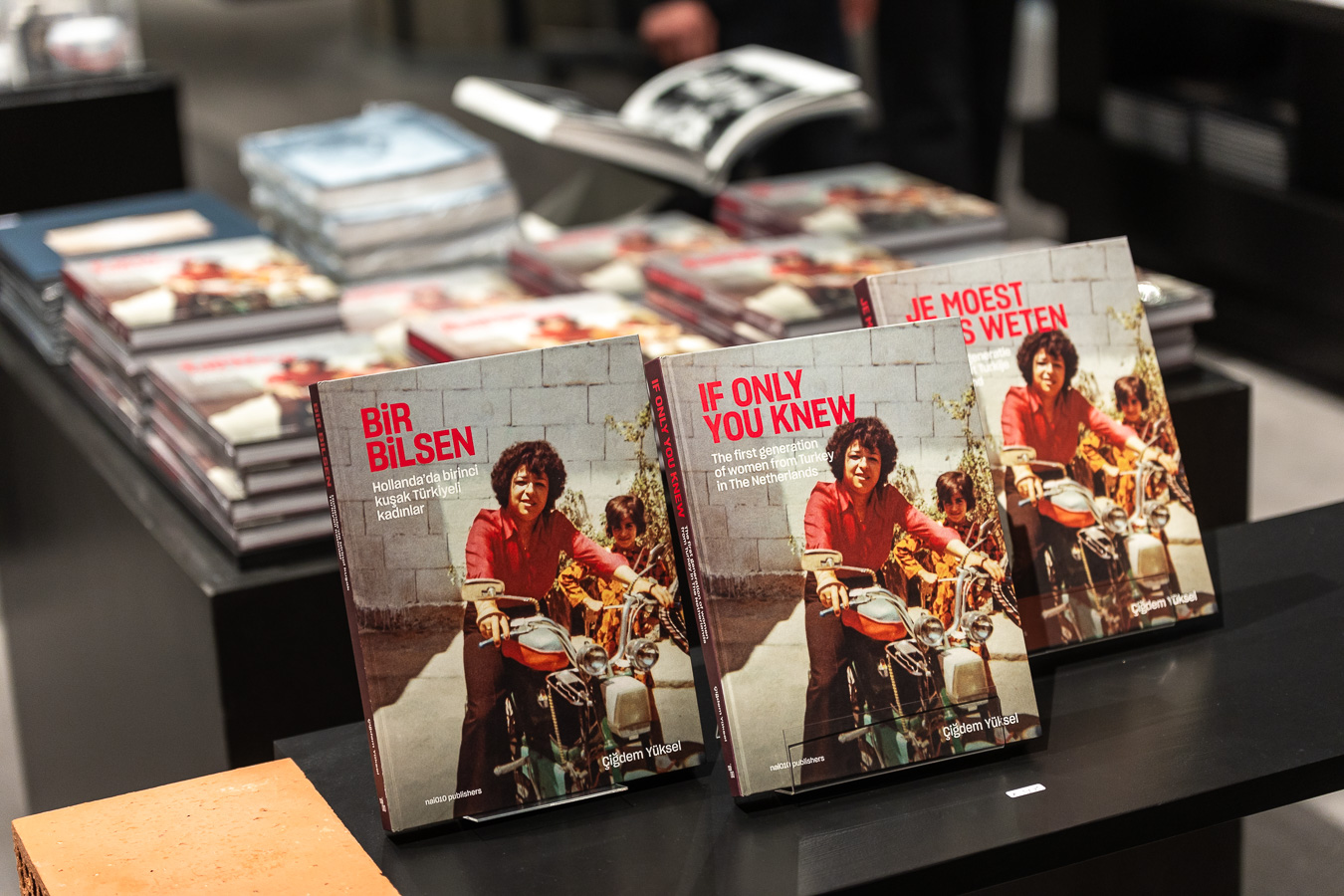
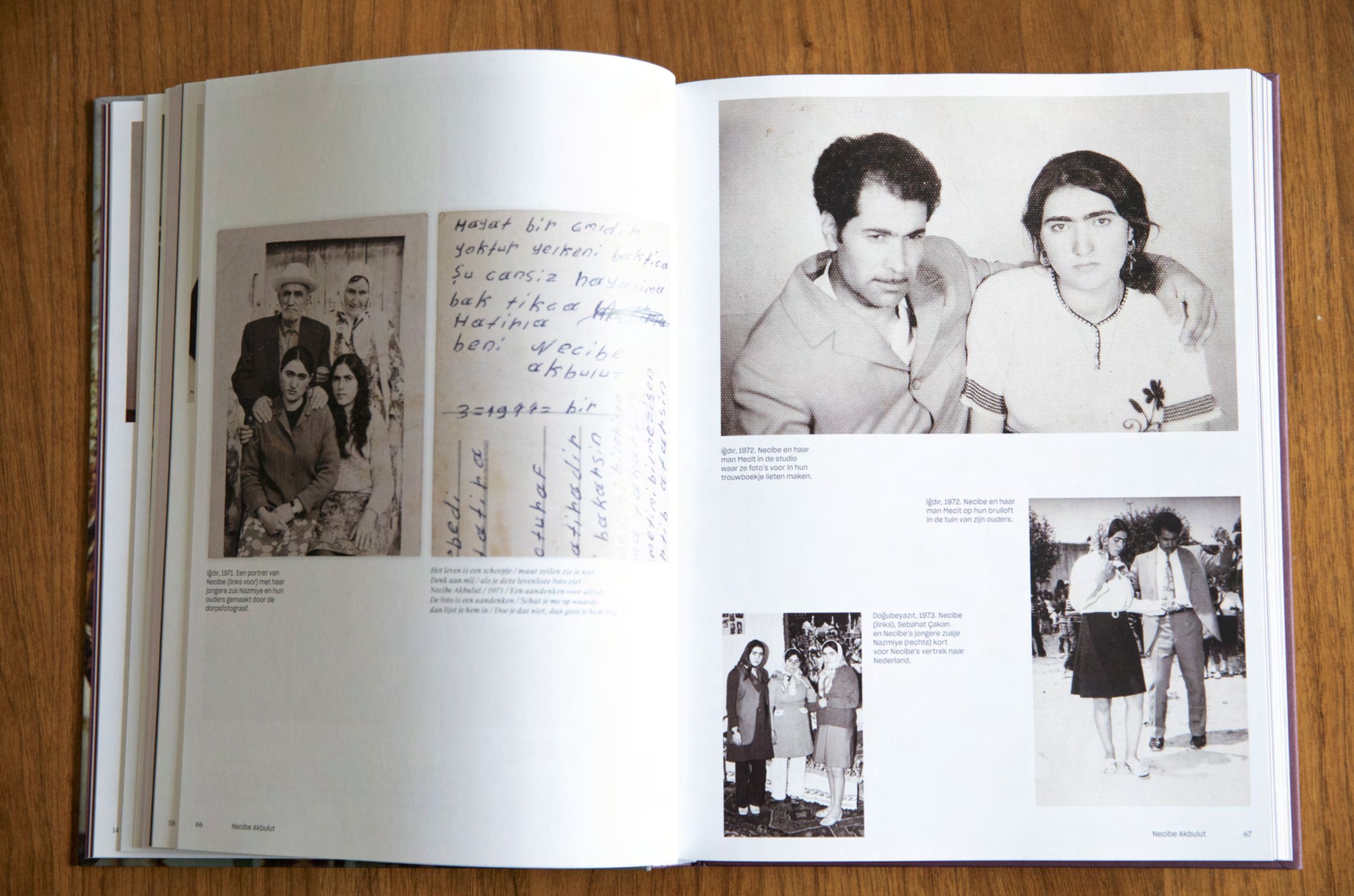

Video installation
While creating the work, I realized that the stories of the women from her generation each sharpen my memory of my grandmother. I fill the gaps I have about my grandmother in my mind with the stories of these other women. Did my grandmother have those dreams too? Would she have felt relieved to be away from her in-laws once she moved to the Netherlands? Was she eager to start to work?
In a video installation, I turn my gaze inward and explores my memories of my grandmother.
How do you focus on the past when memories fade? What happens to all the memories when someone is no longer there? Where do you store them in your mind? What if you can't access them anymore because too much time has passed? In the installation, I alternate these questions with my memories and questions about my grandmother.
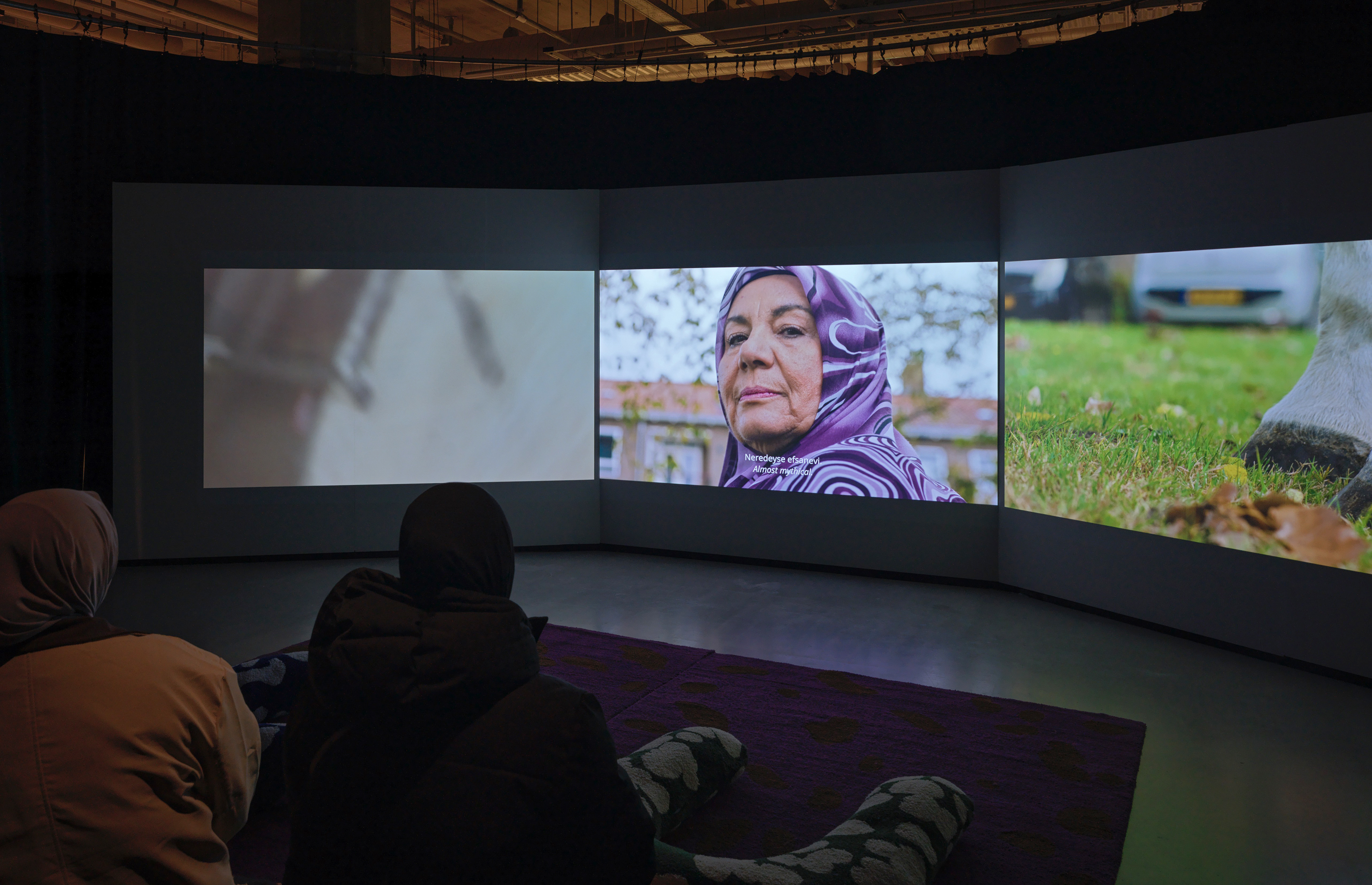
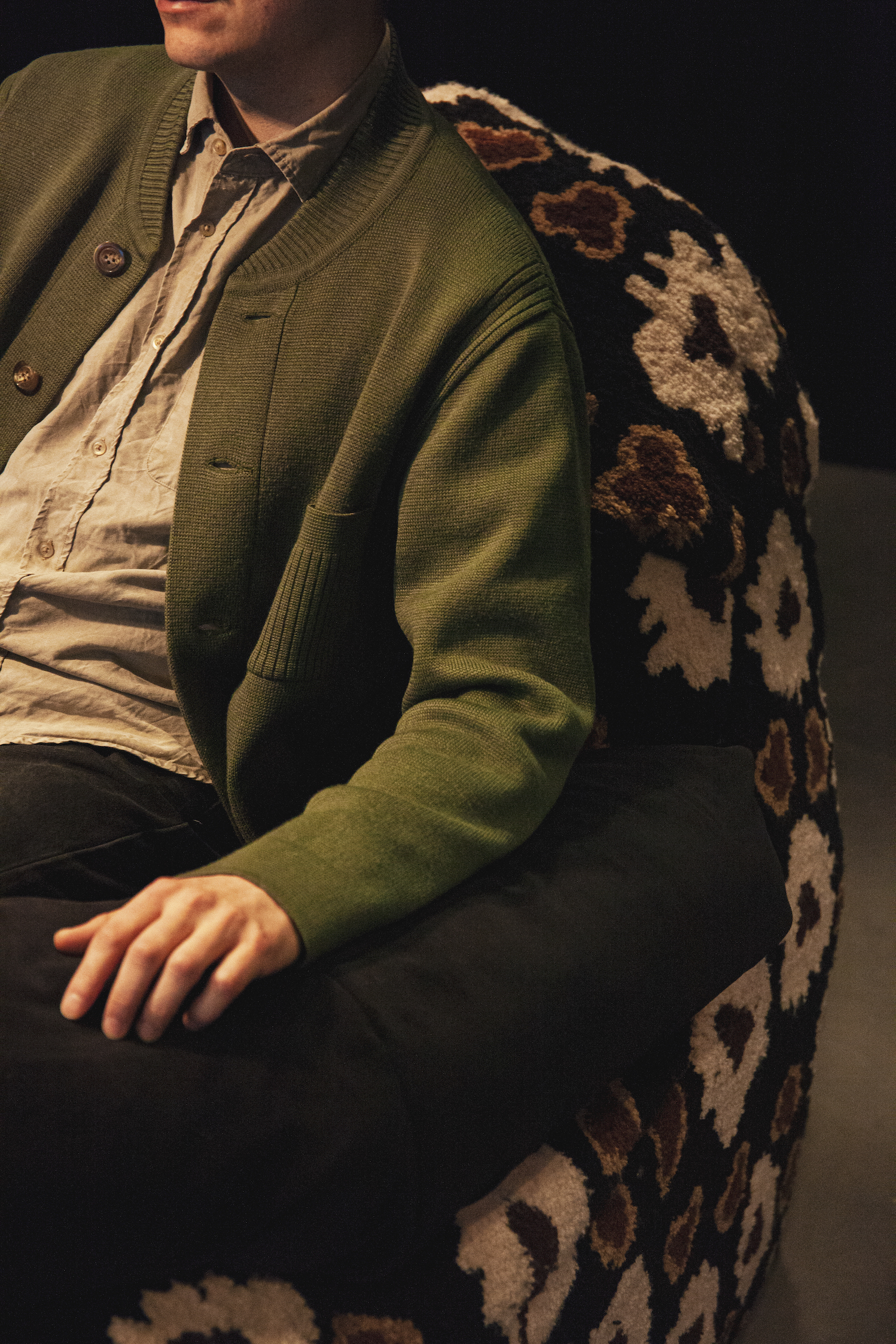

Çiğdem Yüksel and Bertien van Manen
For my project, I also conducted research in archives. Are there images that actually represent women who resemble my grandmother? I came across the book ‘Vrouwen te Gast’ (Women as Guest) in which photographer Bertien van Manen (1935-2024) portrayed female migrants in a way that I could relate to. In her 1979 book, Van Manen depicts female labor migrants or the wives of labor migrants, their often primitive living conditions, but also their work, celebrations, and leisure activities.
Van Manen's iconic work has its own place in the project and engages in a dialogue with My work. I have re-photographed some of the women from Van Manen's book.
Van Manen's iconic work has its own place in the project and engages in a dialogue with My work. I have re-photographed some of the women from Van Manen's book.
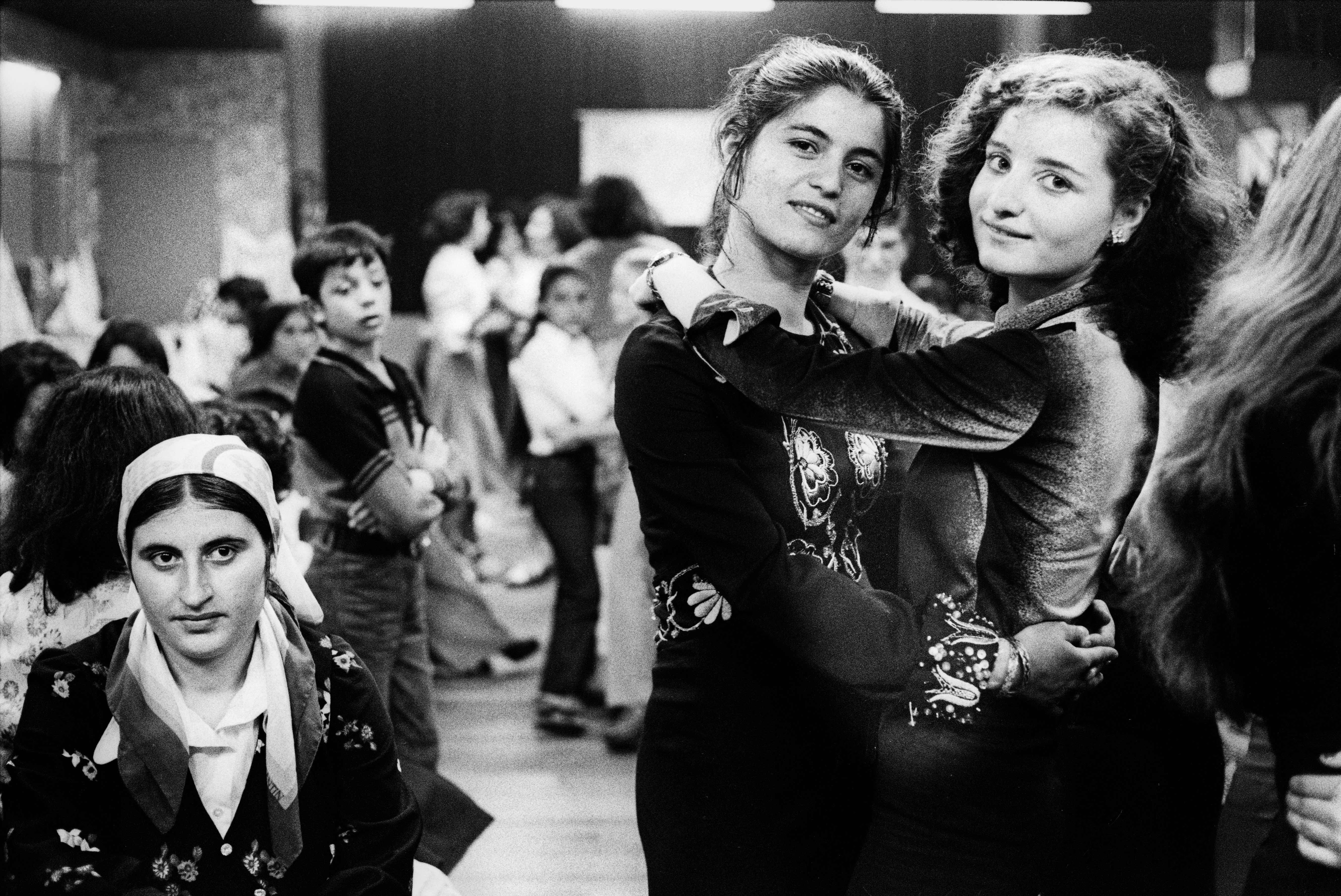
Photo: Bertien van Manen
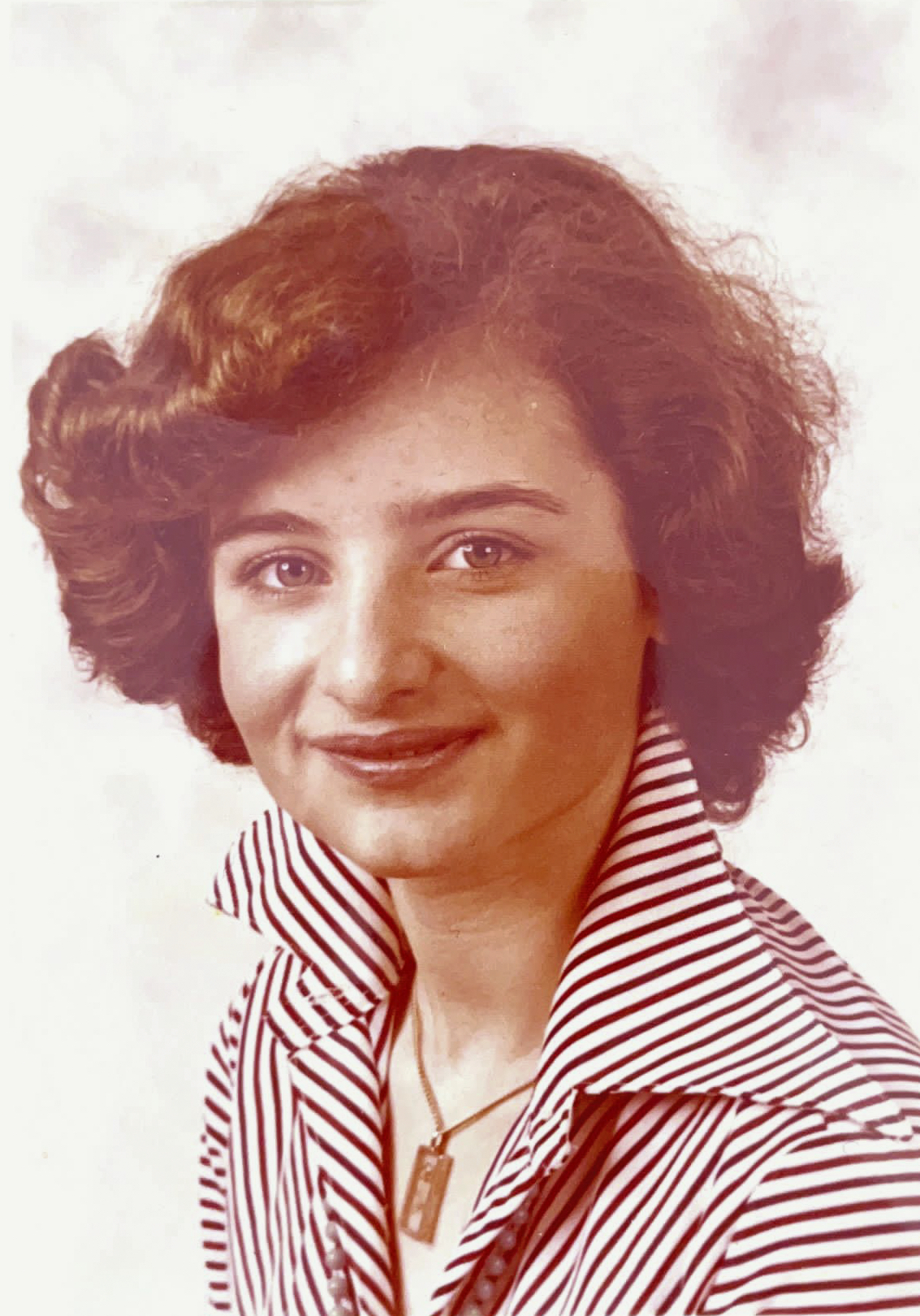

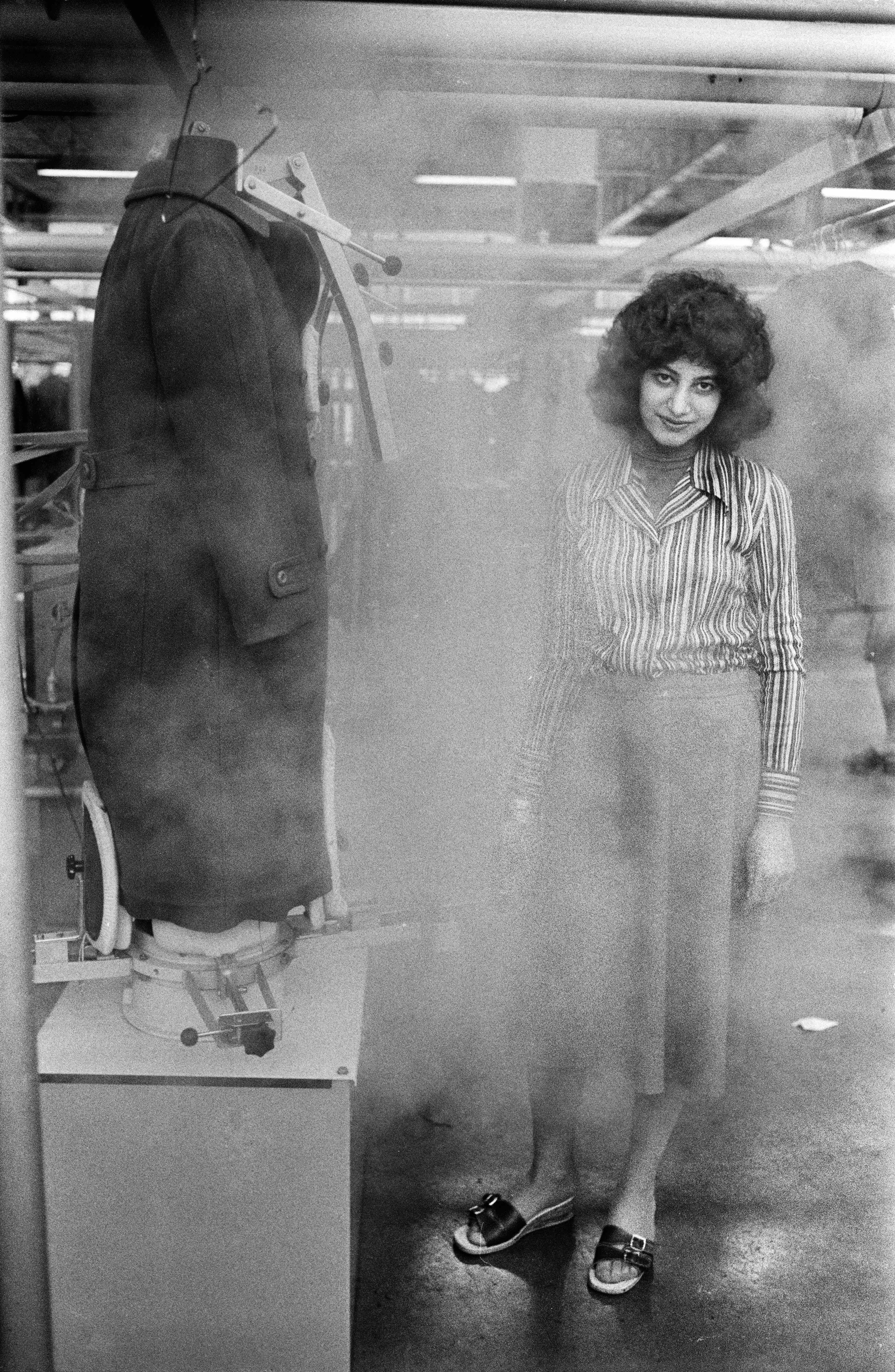
Photo: Bertien van Manen
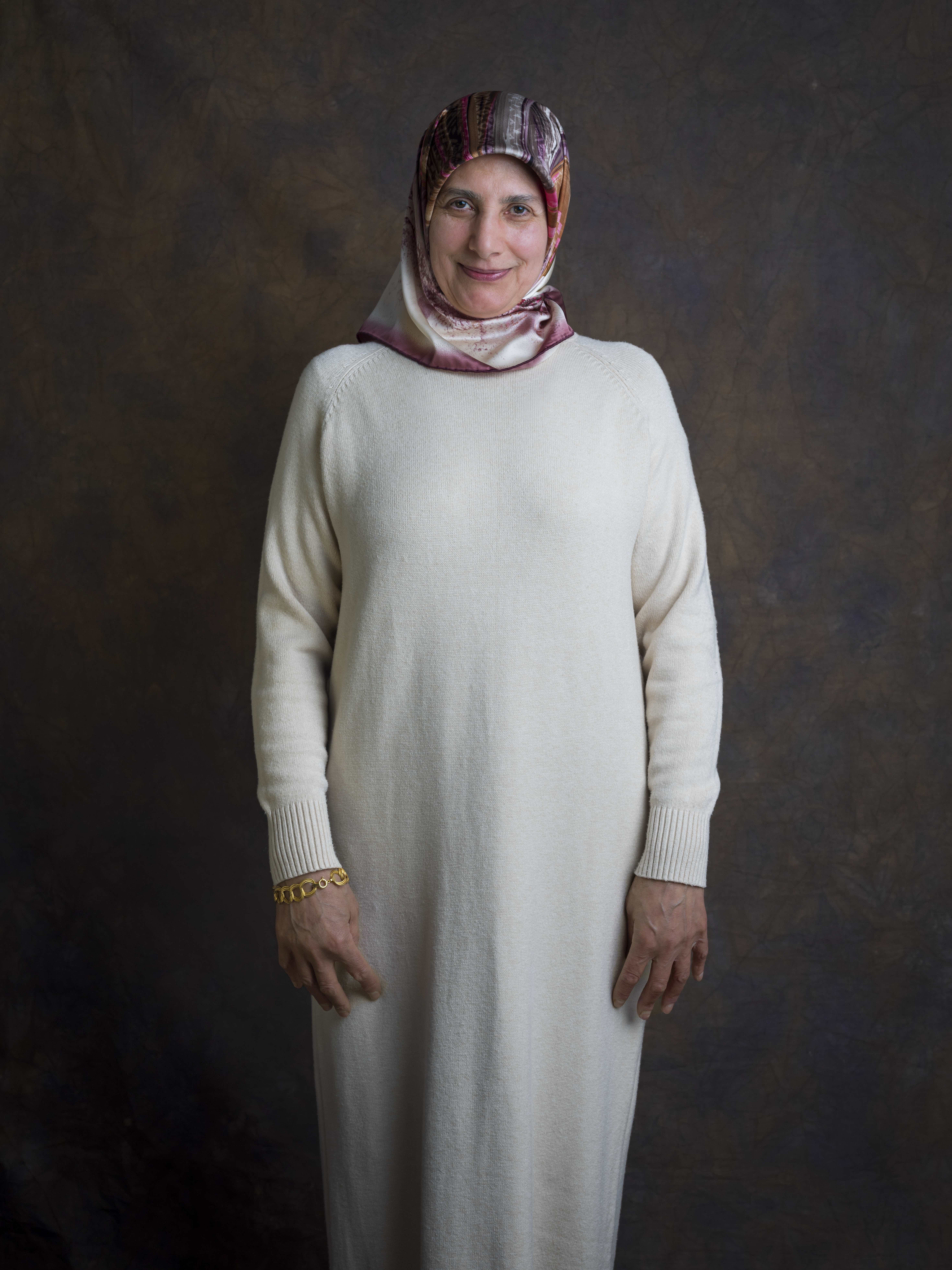
If Only You Knew
If you only knew…- Bir bilsen… in Turkish. This is how many women began their life stories when I visited them. They’re women much like my grandmother, who left their homelands to start a new life in the Netherlands. Yet, their narratives are noticeably absent from the Dutch visual archives and historical narratives.
I am changing this with photos from family albums, interviews and portraits. Through my work emerges an image of women navigating unfamiliar terrain, learning a new language, and tending to their families. Often overlooked is their pivotal role in the Dutch economy as factory workers or cleaners, or their fight for freedom and equal rights for all women in general and (Turkish) migrant woman in particular. I have visited 22 women from Turkey, now in their seventies and eighties, to collect and preserve their stories for future generations. Time is of the essence to embed their stories within Dutch history.
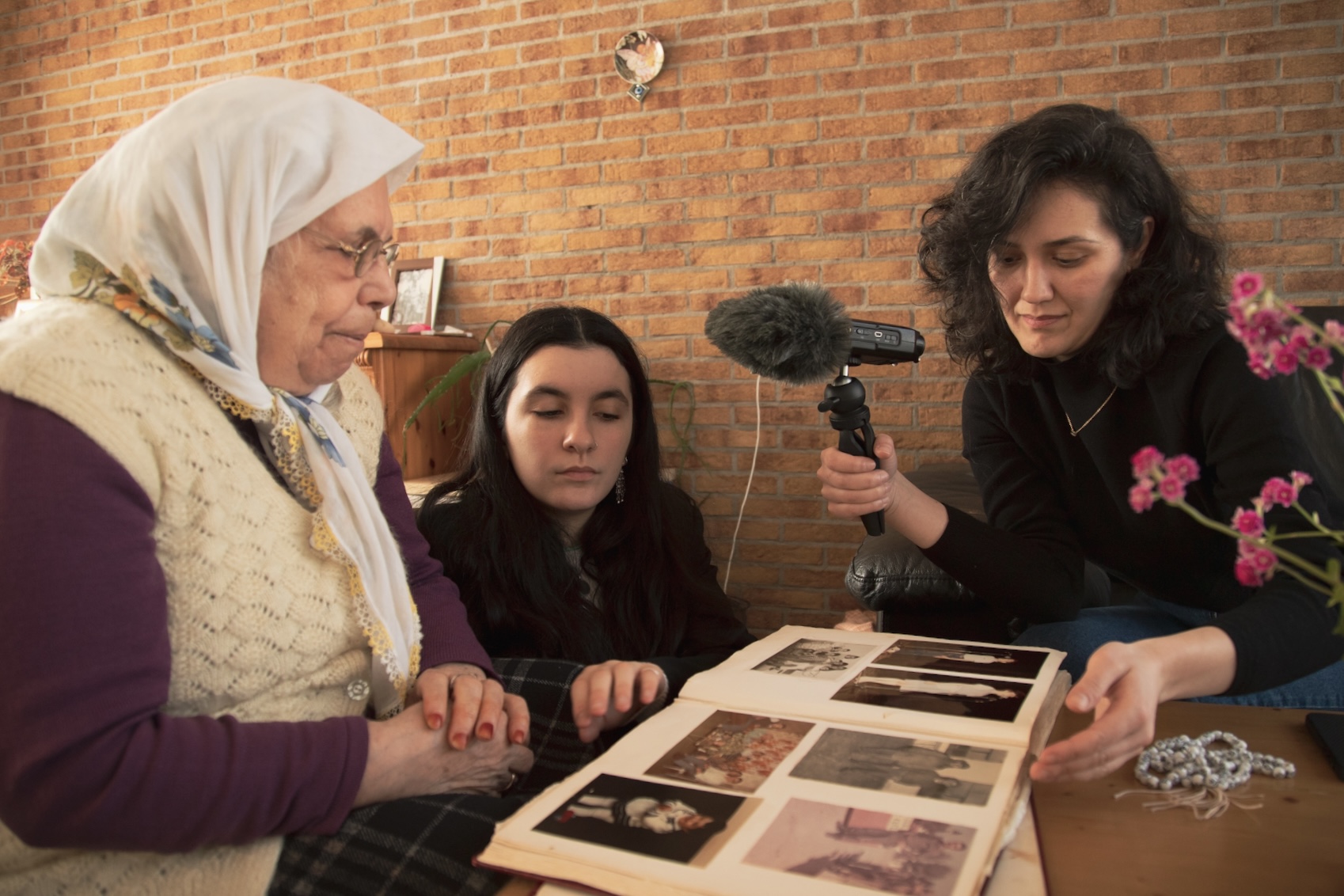

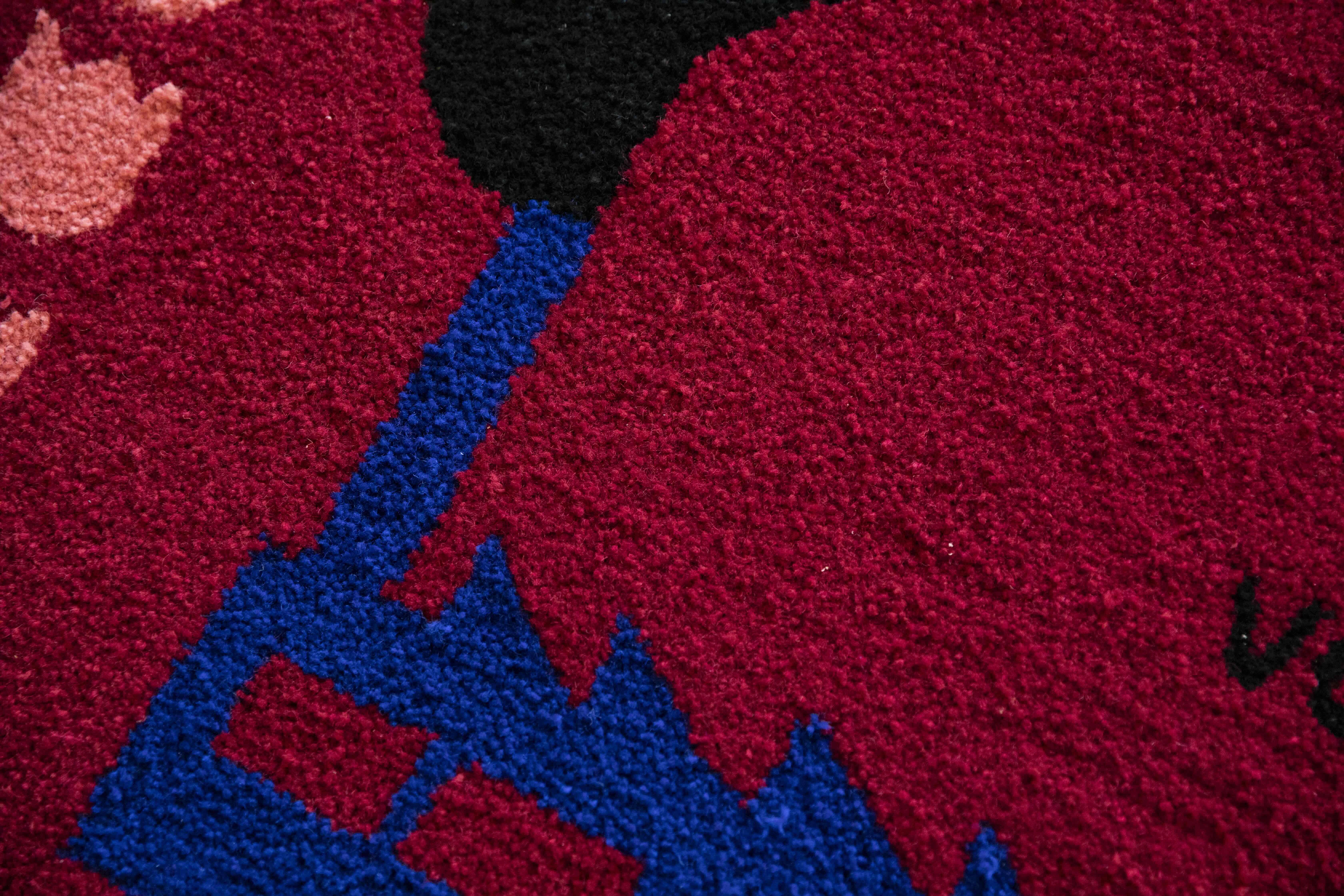


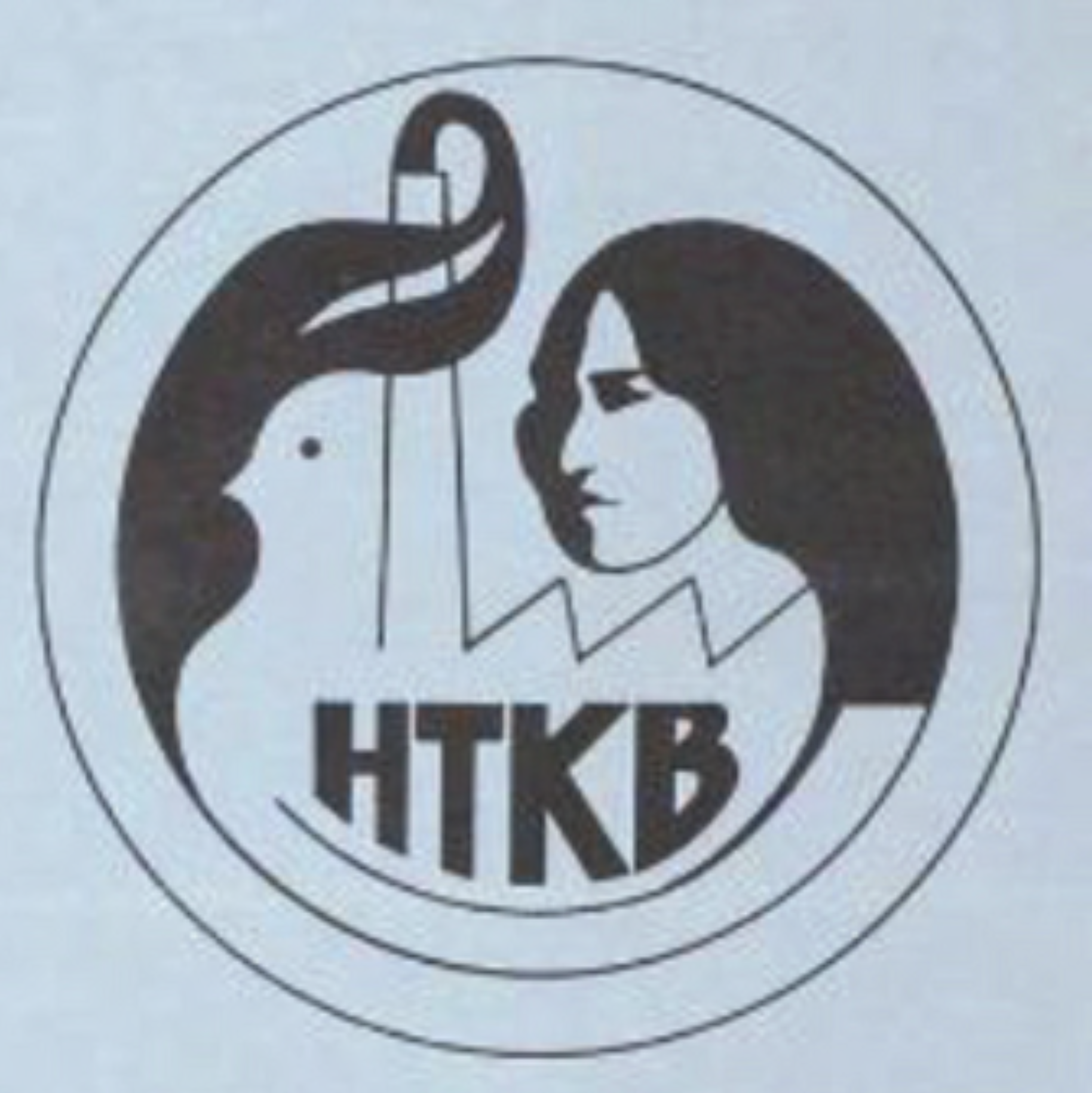
Adding more layers to the project
In addition to working with photography, personal archives from family albums, text, and video to explore collective memory, I have recently begun to incorporate textiles into my artistic practice. This marks the emergence of a new medium within my visual work - one that continues to evolve.
Following my first tufted textile piece, I took a further step in this development by creating a tapestry for the Amsterdam Museum, presented in the exhibition Vrouwen van Amsterdam – een ode. In this work, I combined textile and photography to pay tribute to the HTKB (Hollanda Türkiyeli Kadınlar Birliği), the Turkish women’s organisation that championed the rights of migrant women in the Netherlands. Historically, tapestries have served as carriers of stories and significant events - visual archives through which histories are preserved and passed on. I incorporated archival images of six women alongside symbols and a slogan from the HTKB, to represent their struggle and honour their contribution to the history of Amsterdam.
Credits:
Photography: Çiğdem Yüksel, Bertien van Manen
Initiative, research and interviews: Çiğdem Yüksel
Curators: Iris Bergman (Bertien van Manen), Frederiek Biemans (Prospektor), Frits Gierstberg (NFM)
Creative producer: Eefje Blankevoort (Prospektor)
Head of Presentation and Public Outreach: Grace Wong-Si-Kwie
Project management: Maaike de Kleijn (K&H), Dorothée Raemaekers (NFM), Laura Verduijn (Prospektor), Mariël Vermue (NFM)
Spatial and graphic design: Mayra Slagboom, Kummer & Herrman
Lithography: Marc Gijzen
Scans: Eelco Loode (NFM)
Printing and framing: Zwaan Fotografie & Presentatie, Fotovaklaboratorium 'De Verbeelding', SWOON Sign & Visual, Schunck (loan)
Lettering: SWOON Sign & Visual
Texts: Hizir Cengiz, Mila Lemmens, (Stichting BMP), Meral Polat
Text editing: Lara Aerts, Frederiek Biemans, Frits Gierstberg, Çiğdem Yüksel
Translation:
Turkish: Aslı Güneş, Hanneke van der Heijden
English: Roxy Merrell, Janey Tucker
Assistance in research & photography: Afsaneh Ghafarian Rabe’I, Simaa al-Saig, Seleme Aydin, Zehra Göktas, Ece Mesge, Dimitri Valentijn
Research internship Universiteit Utrecht: Joost Urselmann
Video installation:
Concept and editing: Eefje Blankevoort, Thomas Vroege, Çiğdem Yüksel
Camera: Ton Peters, Emo Weemhoff, Çiğdem Yüksel
Sound design: Burak Öztaş
Colour grading: Thomas Vroege
Equipment: Mr. Beam
Tufted furniture:
Furniture design: Noor Bouterse (Van Noor Upholstery), Michael Klinkenberg (Mr. Soundmount), Çiğdem Yüksel
Tufting: Textiel Museum
Tufted cushions and carpets:
Tufting: Çiğdem Yüksel
Upholstery: Noor Bouterse (Van Noor Upholstery)
Video portraits:
Interviews: Çiğdem Yüksel
Camera: Thomas Roebers
Editing: Eefje Blankevoort
Video Çiğdem Yüksel about Bertien van Manen:
Direction, camera and sound: Rosa Ruth Boesten, From the documentary Droombeeld (Prospektor / NTR, 2024)
Exhibition installation: René Duinkerken, Rop de Graaf, Pim van Halem, Sigmund de Jong, Tryggvi Kristinsson, Marcel Langenberg, Jerrel Manué l, Jos van der Meulen, Jan Neggers
Upholstery: Crea Theater Textiel, KRACHTvrouwen
Lighting: Peter Romkema Lichtontwerp
Publicity & Press: Ditte Ooms (NFM), Natasja Wielandt (Collaburo)
With special thanks to the 22 women, their daughters, granddaughters and families who shared their stories and family pictures:
İclal Sürmeli, Hatun Kaş, Fadime Kahvecioğlu Balkan, Zehra Özgül, Feride Toper, Necibe Akbulut, Fatma Bulaz, Selvet Şükür, Esma Turgut Özçelik, Meryem Karaçadır Yıldırım, Necla Özsoy, Meneyşe Akpınar, Sevgi Akpınar, Fatma Akın, Yeter Akın, Feride Köycü, Güllü Çetin, Birgül Gültekin Özşahin, Maviye Karaman, Hadiye Kesmer, Nazife Kaya, Şerife Polat, Şefika Öder Gider, Solmaz Göktas, Zehra Göktas, Döndü Öcal, Şebnem Yozgat
Photography: Çiğdem Yüksel, Bertien van Manen
Initiative, research and interviews: Çiğdem Yüksel
Curators: Iris Bergman (Bertien van Manen), Frederiek Biemans (Prospektor), Frits Gierstberg (NFM)
Creative producer: Eefje Blankevoort (Prospektor)
Head of Presentation and Public Outreach: Grace Wong-Si-Kwie
Project management: Maaike de Kleijn (K&H), Dorothée Raemaekers (NFM), Laura Verduijn (Prospektor), Mariël Vermue (NFM)
Spatial and graphic design: Mayra Slagboom, Kummer & Herrman
Lithography: Marc Gijzen
Scans: Eelco Loode (NFM)
Printing and framing: Zwaan Fotografie & Presentatie, Fotovaklaboratorium 'De Verbeelding', SWOON Sign & Visual, Schunck (loan)
Lettering: SWOON Sign & Visual
Texts: Hizir Cengiz, Mila Lemmens, (Stichting BMP), Meral Polat
Text editing: Lara Aerts, Frederiek Biemans, Frits Gierstberg, Çiğdem Yüksel
Translation:
Turkish: Aslı Güneş, Hanneke van der Heijden
English: Roxy Merrell, Janey Tucker
Assistance in research & photography: Afsaneh Ghafarian Rabe’I, Simaa al-Saig, Seleme Aydin, Zehra Göktas, Ece Mesge, Dimitri Valentijn
Research internship Universiteit Utrecht: Joost Urselmann
Video installation:
Concept and editing: Eefje Blankevoort, Thomas Vroege, Çiğdem Yüksel
Camera: Ton Peters, Emo Weemhoff, Çiğdem Yüksel
Sound design: Burak Öztaş
Colour grading: Thomas Vroege
Equipment: Mr. Beam
Tufted furniture:
Furniture design: Noor Bouterse (Van Noor Upholstery), Michael Klinkenberg (Mr. Soundmount), Çiğdem Yüksel
Tufting: Textiel Museum
Tufted cushions and carpets:
Tufting: Çiğdem Yüksel
Upholstery: Noor Bouterse (Van Noor Upholstery)
Video portraits:
Interviews: Çiğdem Yüksel
Camera: Thomas Roebers
Editing: Eefje Blankevoort
Video Çiğdem Yüksel about Bertien van Manen:
Direction, camera and sound: Rosa Ruth Boesten, From the documentary Droombeeld (Prospektor / NTR, 2024)
Exhibition installation: René Duinkerken, Rop de Graaf, Pim van Halem, Sigmund de Jong, Tryggvi Kristinsson, Marcel Langenberg, Jerrel Manué l, Jos van der Meulen, Jan Neggers
Upholstery: Crea Theater Textiel, KRACHTvrouwen
Lighting: Peter Romkema Lichtontwerp
Publicity & Press: Ditte Ooms (NFM), Natasja Wielandt (Collaburo)
With special thanks to the 22 women, their daughters, granddaughters and families who shared their stories and family pictures:
İclal Sürmeli, Hatun Kaş, Fadime Kahvecioğlu Balkan, Zehra Özgül, Feride Toper, Necibe Akbulut, Fatma Bulaz, Selvet Şükür, Esma Turgut Özçelik, Meryem Karaçadır Yıldırım, Necla Özsoy, Meneyşe Akpınar, Sevgi Akpınar, Fatma Akın, Yeter Akın, Feride Köycü, Güllü Çetin, Birgül Gültekin Özşahin, Maviye Karaman, Hadiye Kesmer, Nazife Kaya, Şerife Polat, Şefika Öder Gider, Solmaz Göktas, Zehra Göktas, Döndü Öcal, Şebnem Yozgat
If Only You Knew
ProjectFrom the late 1960s, more and more women from Turkey came to the Netherlands to build new lives. What did those lives look like? We know very little about it. My book and exhibiton 'If Only You Knew' bring the stories of these women to light and give them a lasting place in Dutch history.
Bir bilsen… If only you knew… Many women begin their life stories this way when I visit them. Like Maviye, who fought for women's rights, and Selvet, who worked three shifts a day and barely saw her children as a result. Twenty-two of them are portrayed through interviews, photos from family albums, and new portraits of the women, who are now between sixty and eighty years old.
They talk about the pain of migration, homesickness, getting lost, and finding their way. Working, taking care of children, learning the language. Love and unhappy marriages. Being restricted as women and striving for emancipation. Their contribution to the Dutch economy as factory workers or cleaners, and their struggle for freedom and equal rights. Their stories are diverse, layered, and ambiguous, as every human experience is.
If Only You Knew is a multimedia project and photobook that was on display at the Nederlands Fotomuseum in Rotterdam until may 2025. The photo book is available through Nai010 publishers.
Bir bilsen… If only you knew… Many women begin their life stories this way when I visit them. Like Maviye, who fought for women's rights, and Selvet, who worked three shifts a day and barely saw her children as a result. Twenty-two of them are portrayed through interviews, photos from family albums, and new portraits of the women, who are now between sixty and eighty years old.
They talk about the pain of migration, homesickness, getting lost, and finding their way. Working, taking care of children, learning the language. Love and unhappy marriages. Being restricted as women and striving for emancipation. Their contribution to the Dutch economy as factory workers or cleaners, and their struggle for freedom and equal rights. Their stories are diverse, layered, and ambiguous, as every human experience is.
If Only You Knew is a multimedia project and photobook that was on display at the Nederlands Fotomuseum in Rotterdam until may 2025. The photo book is available through Nai010 publishers.



Exhibition Nederlands Fotomuseum
If Only You Knew consists of an exhibition, a book, and a video installation, and focuses on the first generation of women from Turkey in the Netherlands. At the heart of the exhibition is my video installation. Surrounding it are portraits of the women, captured in a dignified, almost painterly manner by me. These are complemented by their personal archives: pages from their family albums, large photos from their vacations, studio portraits, fragments of memories. Everything is presented alternately in video, photography, and installations. As I reconnect with and interviews the women from 'Vrouwen te Gast', my work also enters into a (visual) dialogue with Van Manen's images. Bertien van Manen's work represented one of the first (female) external perspectives on this generation of women. Honest, raw, and personal, it is not only powerful but also represents the archive that has been overlooked, the gaze and image that have been forgotten. Her work takes on an honorable role in the exhibition that does justice to its iconic value.





İclal Sürmeli
Urfa (1954)
Place of residence: Schiedam
![]()
Urfa (1954)
Place of residence: Schiedam

‘The lion’s daughter of chef Ali, that’s what my father’s friends called me’
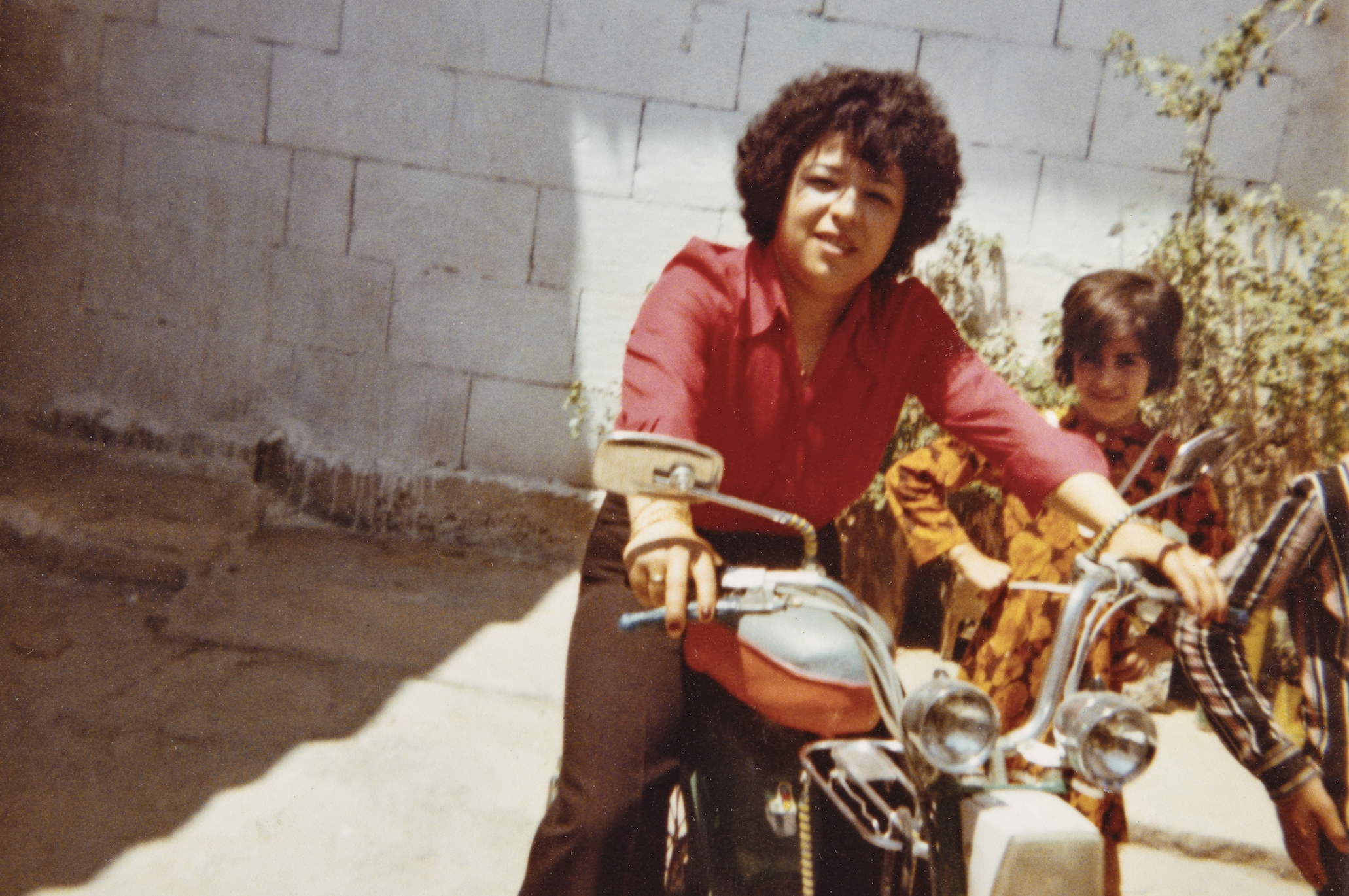

I drove big cars, wore leather jackets and I got infights. Like that time when a Turkish film was playingat the Schiedam Passage Theater. A boy had saidsomething rude about the women in the audience. Igrabbed him, pushed him against the door, andpunched him in the face – bam!

Oral history video
Several of the women featured in the exhibition can also be seen on video. In filmed interviews, they recount their life stories with a photo album on their lap, sharing memories through the photographs they show. Iclal, for instance, talks about the day she arrived in the Netherlands and her dream of riding a motorcycle. Birgül shares her experience of meeting photographer Bertien van Manen and her memories of the moment Van Manen photographed her. Zehra, a third-generation Turkish-Dutch woman, reflects on what her grandmother’s story means to her. And Selvet tells how she fell in love with her husband, came to the Netherlands with him, and had to work hard to obtain her residence permit.
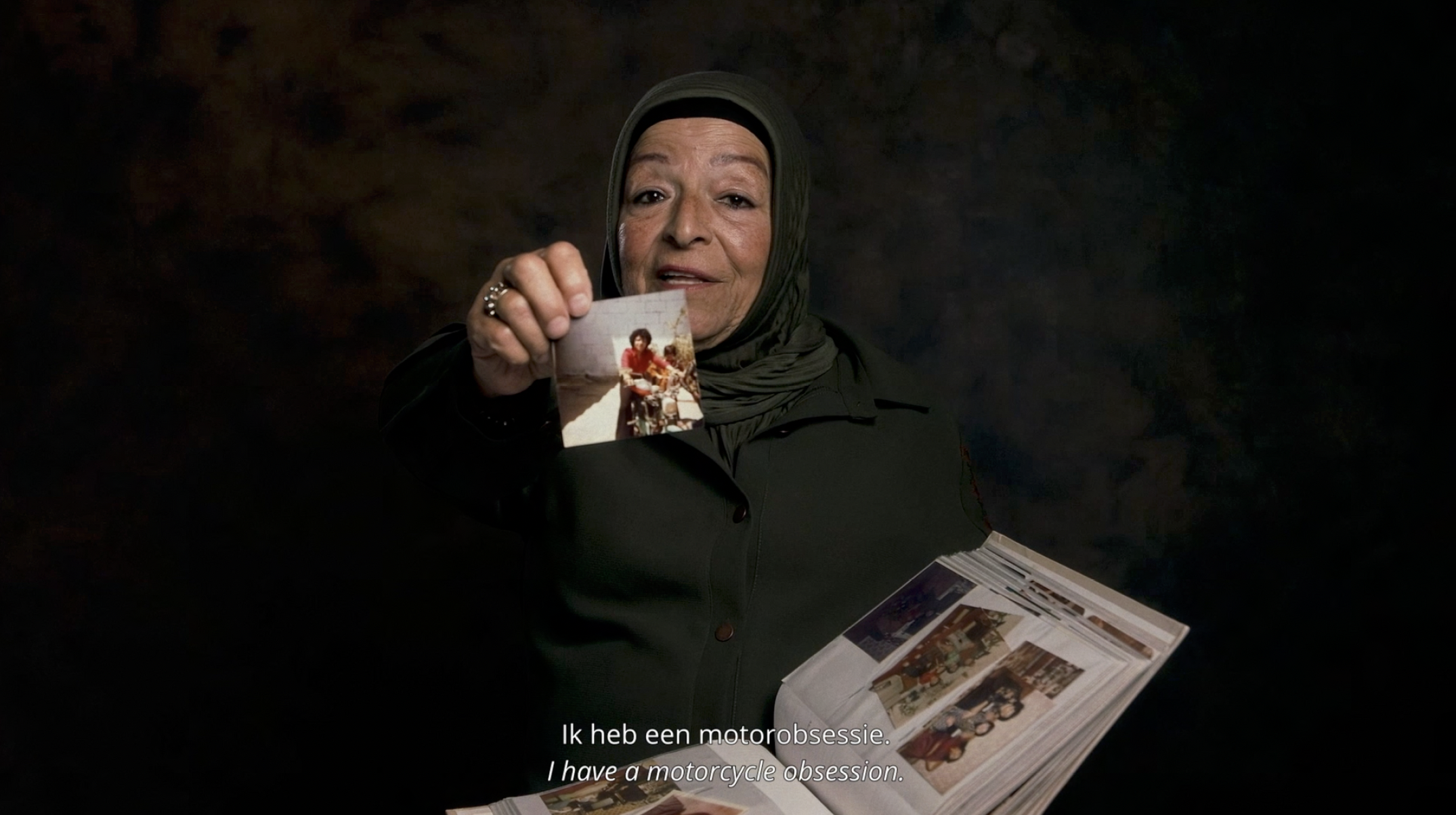

Publication
All of these personal stories and photographs have been compiled in the book If You Only Knew. This publication serves as a lasting record, honoring the lives and voices of these women, and ensuring their experiences and photographic archives are rightfully embedded within our collective history.



Video installation
While creating the work, I realized that the stories of the women from her generation each sharpen my memory of my grandmother. I fill the gaps I have about my grandmother in my mind with the stories of these other women. Did my grandmother have those dreams too? Would she have felt relieved to be away from her in-laws once she moved to the Netherlands? Was she eager to start to work?
In a video installation, I turn my gaze inward and explore my memories of my grandmother.
How do you focus on the past when memories fade? What happens to all the memories when someone is no longer there? Where do you store them in your mind? What if you can't access them anymore because too much time has passed? In the installation, I alternate these questions with my memories and questions about my grandmother.



Çiğdem Yüksel and Bertien van Manen
For my project, I also conducted research in archives. Are there images that actually represent women who resemble my grandmother? I came across the book ‘Vrouwen te Gast’ (Women as Guest) in which photographer Bertien van Manen (1935-2024) portrayed female migrants in a way that I could relate to. In her 1979 book, Van Manen depicts female labor migrants or the wives of labor migrants, their often primitive living conditions, but also their work, celebrations, and leisure activities.
Van Manen's iconic work has its own place in the project and engages in a dialogue with my work. I have re-photographed some of the women from Van Manen's book.

Photo: Bertien van Manen



Photo: Bertien van Manen

If Only You Knew
If you only knew…- Bir bilsen… in Turkish. This is how many women began their life stories when I visited them. They’re women much like my grandmother, who left their homelands to start a new life in the Netherlands. Yet, their narratives are noticeably absent from the Dutch visual archives and historical narratives.
I am changing this with photos from family albums, interviews and portraits. Through my work emerges an image of women navigating unfamiliar terrain, learning a new language, and tending to their families. Often overlooked is their pivotal role in the Dutch economy as factory workers or cleaners, or their fight for freedom and equal rights for all women in general and (Turkish) migrant woman in particular. I have visited 22 women from Turkey, now in their seventies and eighties, to collect and preserve their stories for future generations. Time is of the essence to embed their stories within Dutch history.
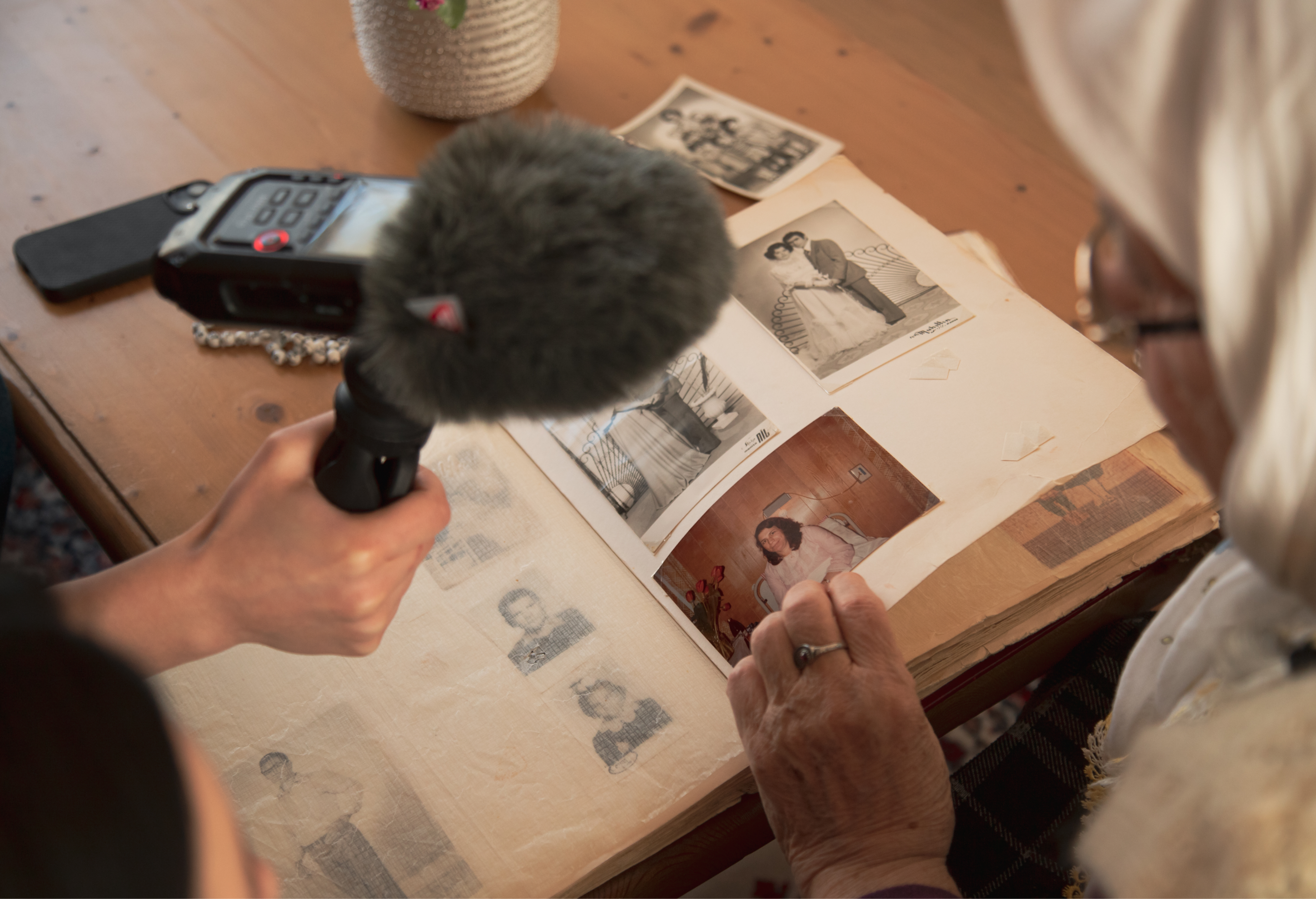
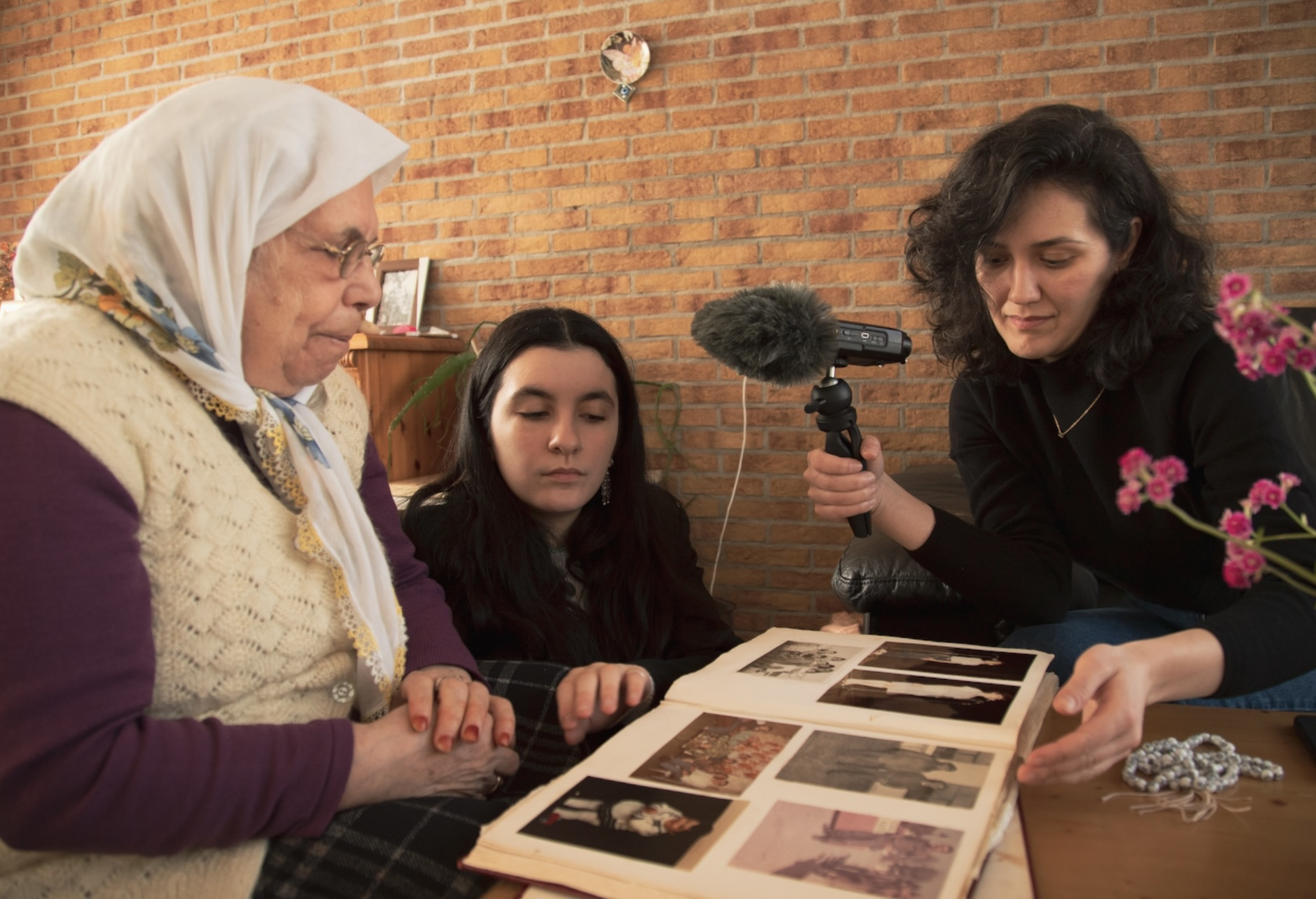
Adding more layers to the project
In addition to working with photography, personal archives from family albums, text, and video to explore collective memory, I have recently begun to incorporate textiles into my artistic practice. This marks the emergence of a new medium within my visual work - one that continues to evolve.
Following my first tufted textile piece, I took a further step in this development by creating a tapestry for the Amsterdam Museum, presented in the exhibition Women of Amsterdam – an ode. In this work, I combined textile and photography to pay tribute to the HTKB (Hollanda Türkiyeli Kadınlar Birliği), the Turkish women’s organisation that championed the rights of migrant women in the Netherlands. Historically, tapestries have served as carriers of stories and significant events - visual archives through which histories are preserved and passed on. I incorporated archival images of six women alongside symbols and a slogan from the HTKB, to represent their struggle and honour their contribution to the history of Amsterdam.





Credits:
Photography: Çiğdem Yüksel, Bertien van Manen
Initiative, research and interviews: Çiğdem Yüksel
Curators: Iris Bergman (Bertien van Manen), Frederiek Biemans (Prospektor), Frits Gierstberg (NFM)
Creative producer: Eefje Blankevoort (Prospektor)
Head of Presentation and Public Outreach: Grace Wong-Si-Kwie
Project management: Maaike de Kleijn (K&H), Dorothée Raemaekers (NFM), Laura Verduijn (Prospektor), Mariël Vermue (NFM)
Spatial and graphic design: Mayra Slagboom, Kummer & Herrman
Lithography: Marc Gijzen
Scans: Eelco Loode (NFM)
Printing and framing: Zwaan Fotografie & Presentatie, Fotovaklaboratorium 'De Verbeelding', SWOON Sign & Visual, Schunck (loan)
Lettering: SWOON Sign & Visual
Texts: Hizir Cengiz, Mila Lemmens, (Stichting BMP), Meral Polat
Text editing: Lara Aerts, Frederiek Biemans, Frits Gierstberg, Çiğdem Yüksel
Translation:
Turkish: Aslı Güneş, Hanneke van der Heijden
English: Roxy Merrell, Janey Tucker
Assistance in research & photography: Afsaneh Ghafarian Rabe’I, Simaa al-Saig, Seleme Aydin, Zehra Göktas, Ece Mesge, Dimitri Valentijn
Research internship Universiteit Utrecht: Joost Urselmann
Video installation:
Concept and editing: Eefje Blankevoort, Thomas Vroege, Çiğdem Yüksel
Camera: Ton Peters, Emo Weemhoff, Çiğdem Yüksel
Sound design: Burak Öztaş
Colour grading: Thomas Vroege
Equipment: Mr. Beam
Tufted furniture:
Furniture design: Noor Bouterse (Van Noor Upholstery), Michael Klinkenberg (Mr. Soundmount), Çiğdem Yüksel
Tufting: Textiel Museum
Tufted cushions and carpets:
Tufting: Çiğdem Yüksel
Upholstery: Noor Bouterse (Van Noor Upholstery)
Video portraits:
Interviews: Çiğdem Yüksel
Camera: Thomas Roebers
Editing: Eefje Blankevoort
Video Çiğdem Yüksel about Bertien van Manen:
Direction, camera and sound: Rosa Ruth Boesten, From the documentary Droombeeld (Prospektor / NTR, 2024)
Exhibition installation: René Duinkerken, Rop de Graaf, Pim van Halem, Sigmund de Jong, Tryggvi Kristinsson, Marcel Langenberg, Jerrel Manué l, Jos van der Meulen, Jan Neggers
Upholstery: Crea Theater Textiel, KRACHTvrouwen
Lighting: Peter Romkema Lichtontwerp
Publicity & Press: Ditte Ooms (NFM), Natasja Wielandt (Collaburo)
With special thanks to the 22 women, their daughters, granddaughters and families who shared their stories and family pictures:
İclal Sürmeli, Hatun Kaş, Fadime Kahvecioğlu Balkan, Zehra Özgül, Feride Toper, Necibe Akbulut, Fatma Bulaz, Selvet Şükür, Esma Turgut Özçelik, Meryem Karaçadır Yıldırım, Necla Özsoy, Meneyşe Akpınar, Sevgi Akpınar, Fatma Akın, Yeter Akın, Feride Köycü, Güllü Çetin, Birgül Gültekin Özşahin, Maviye Karaman, Hadiye Kesmer, Nazife Kaya, Şerife Polat, Şefika Öder Gider, Solmaz Göktas, Zehra Göktas, Döndü Öcal, Şebnem Yozgat